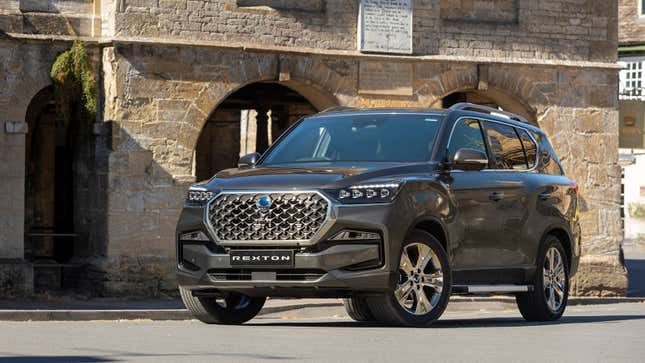
Though it may not be a known quantity on our shores, SsangYong is a company with a long history. It was established a decade after Kia, as South Korea’s second-oldest carmaker, well before Hyundai hit the scene. And yet it’s been shoved off from one unwilling parent to the next, seemingly always on the brink of collapse, its SUVs and trucks forever an option but rarely recommended. SsangYong’s new owner wants to shed those troubles once and for all, and he’s hoping that ditching the name will help the cause.
Jae-Sun Kwak, the chairman of SsangYong and its new parent company KG Group, revealed the plan just before the new year, which may explain why we’re only hearing about it now. Well, that and the fact it’s news that involves SsangYong, a company you may know best for making this thing you likely saw last on an episode of Top Gear from 14 years ago. Anyway, Kwak did not mince words. Per the Korea Herald:
“The name — SsangYong Motor — has a fandom with good memories, but it also has a painful image,” Kwak said at an event held by the Korea Automobile Journalists Association at Four Seasons Hotel Seoul.
“From now, all SsangYong cars will come out to the world under the name of KG [Mobility]. Even with the name change, SsangYong Motor’s history will not change and (the carmaker) will have the same conditions,” he added.
Car brands changing names or adapting different ones used in other markets is nothing new of course, but this might be the first occasion in my three-ish decades on this planet that I’ve seen a manufacturer adopt a new moniker out of shame.
If you’re running KG Group, though, it makes sense. Like Hyundai or Samsung, KG is a chaebol — a conglomerate of loosely-related affiliates typically owned and operated by a dynasty. Kwak started KG in 2003, out of the ashes of a bankrupt fertilizer company. Twenty years later, it comprises KG Chemical, KG Steel, KG Energy, several private equity firms, a cafe chain and — wait for it — every KFC in South Korea. It’s sort of like Vingroup, only maybe without the universities.
Given KG’s short-but-impressive history of growing fast, buying everything and slapping its name on it, a downtrodden automaker like SsangYong provides an excellent opportunity to get into the car business on the cheap. SsangYong’s previous owner, Mahindra, could celebrate some small wins while it ran things between 2011 and 2020: a revitalized lineup, the launch of an all-new nameplate and, most importantly, the brand’s first profitable quarter in nine years. The infrastructure’s nearly there, but the name remains a punchline. A company like KG Group buys SsangYong because it’s ripe for rebranding, not in spite of that.
The switch to KG Mobility won’t happen overnight. First it’ll have to be passed at the next shareholders meeting, scheduled for March. Once it is, KG will set about re-envisioning SsangYong as a startup, and not a company that’s been building trucks for almost four decades. That means electric vehicles, autonomous driving and everything in between — preferably with less pain.